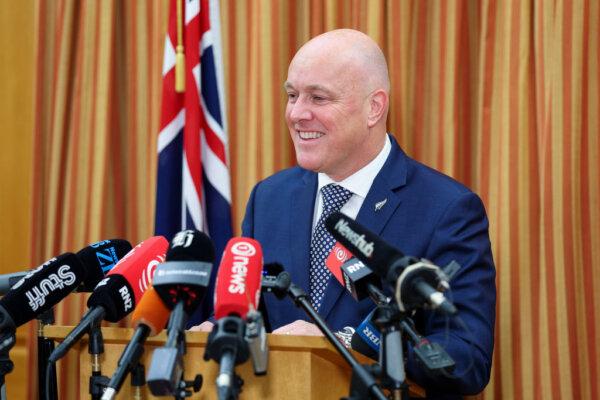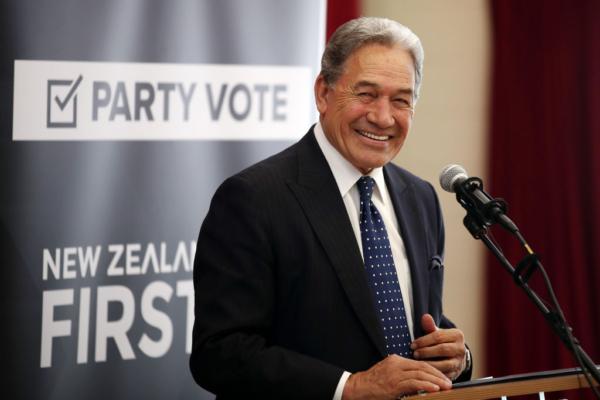[ad_1]
New Zealand will likely be governed by a 3-way coalition involving the libertarian ACT, and nationalist New Zealand First.
New Zealand’s National Party has lost two seats after “special vote” counts concluded on Nov. 3 following the country’s recent election, meaning leader Christopher Luxon will need to rely on powerbroker Winston Peters to form government.
The left-aligned Green Party has 15 seats compared to 14, while Te Pāti Māori (the Māori party) now has six seats, instead of four.
The Labour Party continues to hold the 34 seats it won on the night, while the libertarian party ACT New Zealand has 11 seats and New Zealand First has 8.
“Special votes” are cast from overseas-based voters—many New Zealanders reside in Australia—with around 500,000 votes being counted in the three weeks since election night. The final results were expected on Nov. 3.
The New Zealand Parliament has 120 seats, meaning 61 seats are needed for a majority. The National Party will need ACT and New Zealand First to have enough seats to hold government.
The former Labour government lost nearly half its seats in the election.
National Leader Keen on Stable 3-Way Coalition
National Party leader Christopher Luxon is in talks with ACT New Zealand Party leader David Seymour and New Zealand First leader Mr. Peters on how a three-way coalition could operate.
“We have only just found out the results an hour ago, so we are making progress,” Mr. Luxon said.
“We are going to take as long as it takes to form strong and stable government.”
Mr. Luxon said he wanted to negotiate in good faith, and would not elaborate on which policies that could be up for change.
“What is important here is we can deliver how we can deliver for the New Zeland people a strong and stable government,” Mr. Luxon said.
The National Party leader ruled out the possibility of a second election.
“We all want to make sure it happens as quickly as it possibly can, it’s just none of us can guarantee when [a coalition agreement is] happening.
“But what we are seeing here is an intent, a genuine intent for everybody to say, we don’t want this to string out, we don’t want this to take oodles of time, but we are going to take as long as we need in order to get that strong and stable government in place.”

Mr. Luxon flagged concerns about the state of the country’s public service.
“I am being very direct about it, I have been unimpressed with some of the outcomes we have seen across the public service,” Mr. Luxon said.
“I think all three parties are aligned on the fact that we want to see better delivery out of our public service. But we have amazing public servants who are incredibly impressive leaders, and I think part of it is actually as a government, to be very clear about what you want to achieve.”
Winston Peters Keen to Move Forward
New Zealand First leader Winston Peters, 78, has worked in coalition with both major parties in previous elections, but in the lead-up to 2023, promised not to work with Labour.
“I think the facts are that we’ve got to go ahead in confidence, so to speak, to get confidence out of the country and also in the process. And that means we have to treat it with urgency and deal with the negotiations as fast as we possibly can,” he said.
“We have to get a sound, much better government underway.”

ACT leader David Seymour, who has clashed with Mr. Peters in the past, said it was possible to work with New Zealand First.
Mr. Peters, discussing his relationship with ACT, said, “We’ve got to put our differences aside and that’s the nature of politics.”
Special Vote Count Concerns
Concerns have been raised about the amount of time needed for the electoral commission—three weeks—to deliver the special vote count.
The special vote results were all announced in one batch on Nov. 3, without daily updates on the count.
Speaking on this situation, Mr. Luxon said there are questions to be asked.
“I think there are a lot of good questions, to be honest, to ask after a government is formed about the electoral commission and what we learnt from this experience,” Mr. Luxon said.
How Do the Parties Work?
National Party is a major centre-right political party in New Zealand founded in 1936. Labour, also a major party, is a centre-left party formed in 1916.
ACT New Zealand is a right-wing libertarian party led by David Seymour and founded by a former Labour minister.
Meanwhile, NZ First is a populist and nationalist political party formed in 1993 when Winston Peters left the National Party.
The Green Party of New Zealand is a left-wing political party, while the Maori Party also leans to the left and advocates for more rights for the Maori people.
[ad_2]
